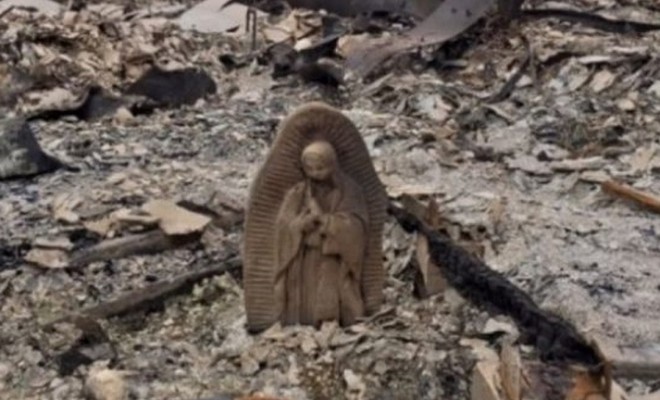
A sign of hope
During Hurricane Harvey, the Rojas family in Robstown, Texas, just west of Corpus Christi, had evacuated three houses on property they own and returned to find all three houses destroyed by fire.
But they also found something that gave them hope — an intact statue of the Virgin Mary.
In addition to expressing thanks to the “Fire Department of Robstown for courage to show up in the storm while the tremendous power, the wind, the rain were going,” the family is taking the statue’s survival as a sign that they can make it, too.
Whether this was an act of God or simply a result of good luck and of the willingness of Robstown firefighters to go out in the middle of a hurricane, in either case it bears witness to the resilience of this one family and the people of Texas more generally.
The story of this statue reminds me of what we saw flying over the Indonesian province of Aceh in a US Navy helicopter, following the catastrophic tsunami of 2004. The city below looked like pictures of Hiroshima after the atomic bomb.
Somewhere between 130,000 to 170,000 people lost their lives or went missing in that disaster. The massive wave had washed up large ships hundreds of yards inland and crushed virtually every structure in the city. Among the few left standing were several mosques and the one cathedral in the center of the city.
Whether an act of God or the work of good civil engineers and architects, that was also a symbol of hope. And what followed was more than just a repairing of the damage. Something better actually resulted, thanks to the resilience of the Indonesians and substantial international help, including from the United States.
Most importantly, it led indirectly but quite decisively to the end of the long running war in Aceh that had killed 15,000 people over the course of several decades of fighting, thanks not only to the creative diplomacy of the EU negotiator, former Finnish prime minister Mahti Ahtisaari, but also to the fact that the province was now wide open to outside observers and neither the Indonesian military nor the GAM rebels could continue with the brutal tactics of the past.
Another dividend — still important albeit less so — was a dramatic change in Indonesian attitudes toward the United States as a result of the rescue effort led by US military helicopters flying over Indonesian territory, not in an act of war, but to bring life-saving food and water to people who were on the brink of dying. According to a Pew poll done in 2005, “79% of Indonesians say they have a more favorable view of the US as a result of the relief efforts.”
Of course Aceh’s rebirth does not repay the loss of tens of thousands of lives or ease the pain of families who must still suffer that loss. Nor is Aceh’s progress without its problems. As American journalist Kira Kay observed on the tenth anniversary of the Tsunami, Aceh, which “was always more conservative than other parts of Indonesia,” had become “more religiously observant since the tsunami, as many people saw the tsunami as God’s punishment for their immorality, evidenced by the fact that many mosques remained standing even as villages around them were wiped out.” The price of ending the civil war was to grant an exceptional degree of autonomy to the province; one result has been the introduction of Shariah law, with its restrictions on women and its discrimination against homosexuals.
The people of Texas, and Houston in particular, have suffered greatly and will continue to suffer, but the courage and generosity they have already shown in helping their neighbors, like the resilience displayed by the people of Aceh, give promise that the rebuilding of Houston, while a mammoth task, could produce an even greater city than before.
Paul Wolfowitz is a visiting scholar at the American Enterprise Institute (AEI) where he works on development and national security issues.
Before joining AEI, Mr. Wolfowitz spent more than three decades in public service and higher education, working in the administrations of seven different presidents. Most recently, he served as president of the World Bank and deputy secretary of defense.At the World Bank he focused on the problem of corruption and the challenges of sub-Saharan Africa. As ambassador to Indonesia and assistant secretary of state for East Asia in the Reagan administration, Mr. Wolfowitz was an advocate of reform and political openness. He was involved in Persian Gulf security for almost 30 years during three different tours at the Department of Defense.
Mr. Wolfowitz has been widely published in many outlets, including The New York Times, The Wall Street Journal, The Washington Post, and The Sunday Times of London. His television appearances include NBC’s “Meet the Press,” CNN’s “Anderson Cooper 360,” and Fox Business Network’s “Lou Dobbs Tonight.”
Mr. Wolfowitz has a Ph.D. in political science from the University of Chicago and a B.A. in mathematics from Cornell University.




